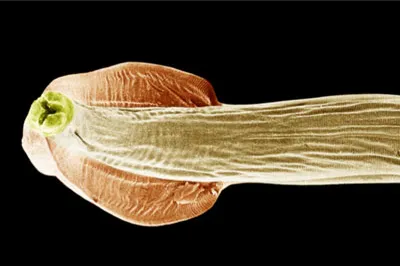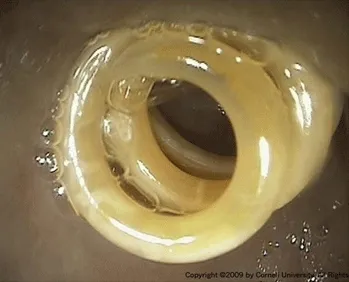Roundworms are among the most prevalent internal parasites affecting dogs, with nearly all puppies becoming infected at some point in their lives. These common parasites can be acquired in various ways, making them easy to spread and a persistent challenge for pet owners. The concerning question for many is: Can I Catch Roundworm From My Dog? The short answer is yes, humans can indeed contract roundworms from dogs, posing a significant public health risk, particularly for children. Understanding the lifecycle, symptoms in dogs, effective prevention strategies, and how to protect yourself and your family is crucial for every dog owner.
What Are Canine Roundworms and How Do Dogs Get Them?
Canine roundworms (most commonly Toxocara canis) are internal parasites that reside in a dog’s intestines. Their lifecycle is complex, allowing for several modes of transmission:
- Transplacental Transmission: Puppies can be infected with roundworm larvae while still in their mother’s uterus. This means they are born with the infection.
- Transmammary Transmission: Nursing puppies can also ingest worm larvae through their mother’s milk.
- Environmental Ingestion: Dogs, especially puppies, can become infected by ingesting microscopic larvated eggs present in contaminated soil or feces. These eggs are incredibly resilient and can survive in the environment for years.
- Ingestion of Paratenic Hosts: Roundworm larvae can be found in the tissues of small animals like mice, birds, or rabbits. If a dog eats one of these infected animals, the larvae can develop into adult worms in the dog’s intestines.
 Close-up microscopic view of a Toxocara canis roundworm, showcasing its anterior end and morphological features.
Close-up microscopic view of a Toxocara canis roundworm, showcasing its anterior end and morphological features.
Recognizing Roundworm Symptoms in Your Dog
While many adult dogs might not show overt signs of roundworm infection, puppies and dogs with heavy worm burdens often exhibit noticeable symptoms. Adult roundworms live in the affected dog’s intestines, consuming nutrients and potentially causing blockages or irritation. Key signs to watch for include:
- Pot-bellied appearance: This is particularly common in puppies and indicates a heavy worm load.
- Diarrhea: Soft, loose stools are a frequent symptom. If you’re concerned about your dog’s digestive health, you might wonder if worms cause diarrhea. The answer is often yes, as the parasites irritate the intestinal lining.
- Vomiting: Dogs may vomit, and in severe cases, you might even observe adult worms in their vomit.
- Weight loss: Despite a good appetite, an infected dog may fail to gain weight or even lose it due to nutrient malabsorption.
- Dull coat: A healthy coat often becomes dull or rough when a dog is battling parasites.
- Coughing: If roundworm larvae migrate through the lungs during their lifecycle, they can trigger a cough.
You may also directly notice adult roundworms in your dog’s feces or vomit. They typically appear white or light brown, are several inches long, and resemble spaghetti. Observing these signs necessitates immediate veterinary attention.
Preventing Roundworm Infections in Your Dog
Given the various ways dogs can contract roundworms, a multi-faceted approach to prevention is essential. Regular deworming, especially for puppies, and maintaining good hygiene are critical.
- Environmental Cleanliness: Regularly clean your dog’s living areas and promptly remove feces. Roundworm eggs become infective after a few weeks in the environment, so quick removal minimizes risk.
- Prevent Predation: If possible, prevent your dog from eating wild animals that might serve as paratenic hosts.
- Puppy Deworming Schedule: Puppies should be treated for roundworms at 2, 4, 6, and 8 weeks of age, followed by a monthly preventive treatment. This aggressive schedule targets worms acquired from the mother.
- Routine Fecal Examinations: Conduct fecal (stool) examinations 2 to 4 times during the first year of life and at least once or twice a year for adult dogs. This helps identify infections that might not be visible.
- Nursing Mother Treatment: Nursing mothers should remain on monthly preventive treatments and be dewormed concurrently with their puppies to reduce transmission risk.
- Heartworm Preventatives: Many broad-spectrum heartworm preventatives also offer protection against common intestinal parasites, including roundworms. Discuss the best options for prevention and treatment with your veterinarian. They can advise on specific products that will help manage and prevent roundworm infestations in your dog and address concerns like whether worms cause a dog to have diarrhea.
 Visual representation of Ascarid roundworms visible within a dog's intestine, illustrating a heavy infection.
Visual representation of Ascarid roundworms visible within a dog's intestine, illustrating a heavy infection.
The Risk to Humans: Can You Catch Roundworm From Your Dog?
Yes, humans can be infected by roundworms from dogs, a condition known as zoonotic transmission. This poses a significant health concern, particularly for certain groups. The primary way humans become infected is by accidentally ingesting microscopic roundworm eggs. These eggs are shed in dog feces and can accumulate in significant numbers in contaminated soil, sandboxes, or other environments where pets have defecated.
Once ingested, the roundworm eggs hatch in the human intestine, and the larvae migrate through the body. Unlike in dogs, these larvae typically cannot develop into adult worms in humans, but their migration can cause various health problems. This condition is broadly known as Larva Migrans, with specific forms:
- Visceral Larva Migrans (VLM): Larvae migrate to internal organs such as the liver, lungs, and brain. Symptoms can range from fever, fatigue, and abdominal pain to more severe neurological signs if the brain is affected.
- Ocular Larva Migrans (OLM): In some cases, larvae can migrate to the eye, causing vision loss, inflammation, and potentially blindness in the affected eye.
Children are particularly vulnerable to roundworm infection because they often play in contaminated soil, put their hands in their mouths, and have less developed immune systems. Individuals with direct contact with potentially contaminated soil, such as gardeners or landscapers, are also at increased risk.
Protecting Yourself and Your Family from Canine Roundworms
Preventing human infection largely hinges on good hygiene and responsible pet ownership:
- Prompt Feces Removal: Always pick up dog feces immediately and dispose of them properly. This prevents roundworm eggs from contaminating the environment.
- Hand Hygiene: Wash hands thoroughly with soap and water after handling pets, gardening, playing outdoors, or coming into contact with soil.
- Supervise Children: Do not allow children to play in areas where animals may have passed feces. Ensure sandboxes are covered when not in use to prevent contamination.
- Regular Veterinary Care for Pets: Keep your dog on a consistent deworming schedule recommended by your veterinarian. Regular fecal exams for your pet are crucial in preventing the spread of parasites.
- Educate Family Members: Ensure everyone in the household understands the risks and the importance of preventive measures.
By adhering to these practices, you can significantly reduce the risk of roundworm transmission from your dog to yourself and your family.
Conclusion
Roundworms are a common and widespread parasite in dogs, with the potential for serious health consequences for both our canine companions and, critically, for humans. Understanding how dogs acquire roundworms, recognizing the symptoms they cause, and implementing diligent prevention strategies are paramount for every responsible pet owner. Regular veterinary check-ups, consistent deworming protocols, and strict hygiene practices are the best defense against these tenacious parasites. If you suspect your dog has roundworms, or if you have any concerns about potential human exposure, consult your veterinarian and a healthcare professional promptly. Prioritizing your dog’s health directly contributes to the well-being of your entire family.
References
- American Veterinary Medical Association (AVMA)
- Companion Animal Parasite Council (CAPC)
- Centers for Disease Control and Prevention (CDC) – Parasites
- Veterinary Medical Textbooks on Parasitology
